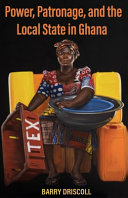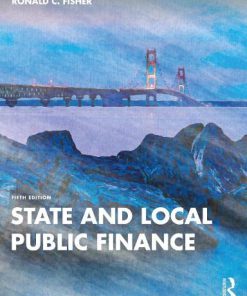Power Patronage and the Local State in Ghana 1st Edition by Barry Driscoll ISBN 0896803287 978-0896803282
$50.00 Original price was: $50.00.$25.00Current price is: $25.00.
Power Patronage and the Local State in Ghana 1st Edition by Barry Driscoll – Ebook PDF Instant Download/Delivery: 0896803287 978-0896803282
Full download Power Patronage and the Local State in Ghana 1st edition after payment

Product details:
ISBN 10: 0896803287
ISBN 13: 978-0896803282
Author: Barry Driscoll
How have the waves of democracy and decentralization that swept the developing world in recent decades affected states―among the most important drivers of poverty and prosperity―at national and local levels in Ghana and beyond? State actors beneath the national level―what Barry Driscoll calls the local state―have considerable responsibility for carrying out state functions, but they are also forced to compete for these local state offices. How does a local state actually work in poor twentieth-century countries? This book offers a descriptive account, as well as a causal explanation, of how political competition affects the local state in Ghana. Driscoll shows how closely fought elections drive local state institutions to provide patronage. The source of these demands for patronage comes not from rent-seeking bureaucrats or landed elites but from the government’s own party volunteers. Driscoll explains how electoral competition affects how local state actors are insulated from such patronage demands. Moreover, these highly competitive, patronage-providing local governments actually have relatively better-qualified senior civil servants at their disposal. Driscoll makes sense of this paradox by introducing the logic of building administrative capacity in order to provide patronage. He then abstracts from the case of Ghana to generalize about how the effect of political competition is shaped by the locally salient variety of clientelism, which in turn is conditioned by the strength of the party system. The book draws on fourteen months of fieldwork in six of Ghana’s districts, far from the nation’s capital city. Ethnographic and interview data come from time spent with market traders, tax collectors, politicians, and other figures in local state offices. Quantitative data come from a survey covering almost all local governments. The result is a detailed account of Ghana’s local state power dynamics that has relevant implications for states across the developing world.
Power Patronage and the Local State in Ghana 1st Table of contents:
-
Introduction
- Overview of power and patronage in Ghana
- Scope and objectives of the study
- Methodology and research approach
-
Historical Context of Political Power in Ghana
- Pre-colonial governance structures
- Colonial influence and legacy
- Post-independence political developments
-
Patronage Networks in Ghana
- Definition and theory of patronage
- Political patronage under various regimes
- Patronage and clientelism in contemporary Ghana
-
The Local State in Ghana
- Structure and functions of local government
- Decentralization and local governance reforms
- Role of local actors in political processes
-
Patronage and Development at the Local Level
- The impact of patronage on local development
- Case studies of local government projects
- Patronage and resource allocation
-
Political Parties and Patronage
- Political party dynamics and local patronage networks
- Party competition and control of local resources
- Electoral strategies and local patronage systems
-
Challenges and Criticisms of Patronage
- Corruption and inefficiency
- Patronage and democratic accountability
- The future of patronage politics in Ghana
-
Conclusion
- Summary of findings
- Implications for Ghana’s political future
- Recommendations for reforms
People also search for Power Patronage and the Local State in Ghana 1st:
patronage and political stability in africa
political structure ghana
power in ghana
what led to ghana’s becoming a powerful state
political patterns of ghana
Tags:
Barry Driscoll,Power Patronage,Local State
You may also like…
Uncategorized
The Basque Seroras Local Religion Gender and Power in Northern Iberia 1550 1800 Amanda L Scott
Politics & Philosophy - Government & Politics
Heads of the Local State Mayors Provosts and Burgomasters since 1800 1st Edition John Garrard Editor
Business & Economics - Professional Finance
State and Local Public Finance 5th Edition by Ronald Fisher 0367467240 9780367467241
Politics & Philosophy - Social Sciences
Politics & Philosophy - Government & Politics
Travel - Asia - Travel
Uncategorized











